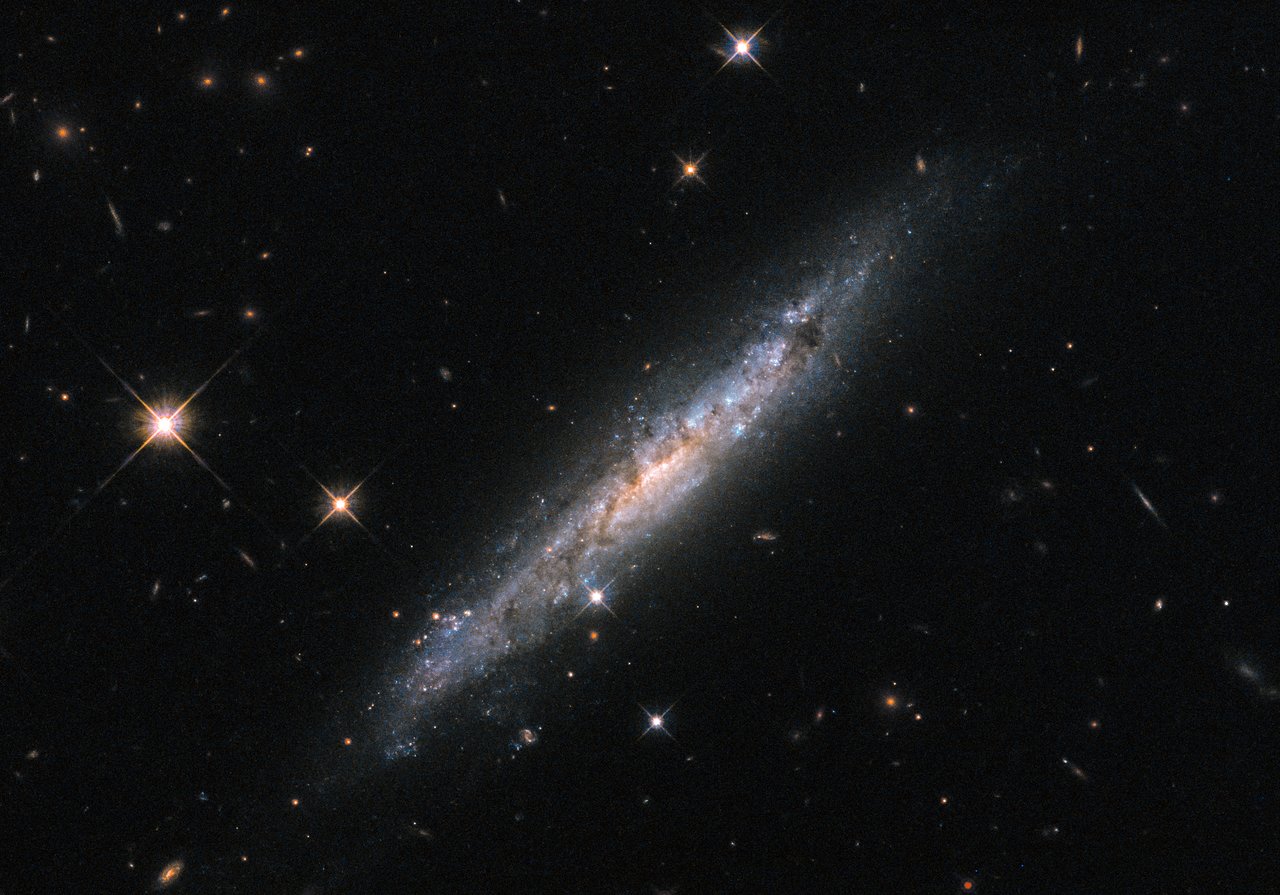Blog
ESO 580-49, may seem tranquil and unassuming, but this spiral galaxy actually displays some explosive tendencies.
In October of 2011, a cataclysmic burst of high-energy gamma-ray radiation — known as a gamma-ray burst, or GRB — was detected coming from the region of sky containing ESO 580-49. Astronomers believe that the galaxy was the host of the GRB, given that the chance of a coincidental alignment between the two is roughly 1 in 10 million. At a distance of around 185 million light-years from Earth, it was the second-closest gamma-ray burst(GRB) ever detected.
Gamma-ray bursts are among the brightest events in the cosmos, occasionally outshining the combined gamma-ray output of the entire observable Universe for a few seconds. The exact cause of the GRB that probably occurred within this galaxy, catalogued as GRB 111005A, remains a mystery. Several events are known to lead to GRBs, but none of these explanations appear to fit the bill in this case. Astronomers have therefore suggested that ESO 580-49 hosted a new type of GRB explosion — one that has not yet been characterised.

Jean Toussaint (born July 27, 1960) is an American jazz tenor and soprano saxophonist.
Toussaint was born in Saint Thomas, U.S. Virgin Islands, and was raised in Saint Thomas and New York City. He learned to play calypso as a child and attended Berklee College of Music in the late 1970s, studying under Bill Pierce (saxophonist). In 1979 he formed a group with Wallace Roney and from 1982 to 1986 was a member of Art Blakey and the Jazz Messengers alongside Terence Blanchard, Donald Harrison, Mulgrew Miller and Lonnie Plaxico. With Blakey he recorded three studio albums, including New York Scene, which won a Grammy for Best Jazz Instrumental Performance.
In 1987, Toussaint moved to London when was he invited to be artist-in-residence at the Guildhall School of Music by Lionel Grigson, at the time the school’s professor of jazz. In the late 1980s Toussaint had a regular slot at the fabled Dingwalls club in Camden Town on Sunday afternoons.Since then, Toussaint has maintained a profile as a band leader in the UK and Europe, playing with British musicians including, among others, Steve Williamson, Courtney Pine, Julian Joseph, Jason Rebello, Cleveland Watkiss. He has also performed in groups led by McCoy Tyner, Gil Evans, Kirk Lightsey, Cedar Walton, Max Roach, Horace Silver and Jeff Tain Watts. In addition he has collaborated with Lionel Loueke.
Toussaint has released ten albums as a leader, his most recent entitled Tate Song in February 2014 with LYTE Records.
In 2015/16 Toussaint devised a project dedicated to his mentor Blakey. The project was entitled ‘Roots & Herbs: The Blakey Project’ and featured an All-Star Lineup of British Jazz Musicians, including Julian Joseph, Byron Wallen, Dennis Rollins, Jason Rebello and Shane Forbes. The group toured the UK extensively throughout 2015 / 2016.
more...Carl Grubbs alto, soprano and tenor saxophonist, is a native of Philadelphia, PA. July 27 1944
He received early training from John Coltrane, who was married to his cousin, Naima. Through his family he was close to many of the history-making musicians of the 1950’s and 60’s. He was a guest soloist at the Philadelphia performance of Reggie Workman’s current project “African Brass”, a tribute to John Coltrane.
Carl’s career can best be described as one of diversity; composer, performer, teacher, leader, recording artist and presenter. With his late brother, Earl Grubbs he formed the Visitors, a quintet that recorded for Muse record label in the early 1970’s. Carl is a former member of the Julius Hemphill Saxophone Sextet; this group toured the United States and Europe performing two productions; Hemphill’s Long Tongues:
A Saxophone Opera and Bill T. Jones/Arnie Zane Production, Last Supper at Uncle Tom’s Cabin: The Promised Land.
Carl Grubbs & Friends performs in major cities in the US; they have also been invited to perform in the cities of Bogota and Medellin, Colombia, S.A. Most recently the group completed a successful eight-city tour of Brazil. On his tours he provides Jazz improvisation workshops to students and professionals.
Currently Carl is Artist in Residence at St. Paul School in Brooklandville, Md. He is an adjudicator for the Maryland State Scholarship program. He has conducted workshops in jazz improvisation in Baltimore City Public Schools under the sponsorship of The Eubie Blake Jazz and Cultural Arts Center. Since 1997 he has served as the Director of SAX: Summer Music & Dance Camp, a camp he founded with his wife Barbara. The two-week camp is held on the campus of Loyola College in Maryland. It provides music and dance education to youth ages 4 – 17 in the Govans community and Baltimore City.
more...1917-1994 Moses Rascoe got his initial guitar in NEW YORK at age 13 and turned professional in Pa some 50-odd years later. Among, he journeyed the roads being a time laborer and vehicle driver, playing electric guitar limited to “a money or a glass or two,” as he informed Jack port Roberts in Living Blues. But he’d found plenty of tracks over time, from outdated Brownie McGhee Piedmont blues to Jimmy Reed’s ’50s jukebox strikes, so when he retired from trucking at age 65, he provided his music a go. The neighborhood folk-music community got notice, as do blues and folk celebrations from Chicago to European countries. Rascoe documented his first record live at Godfrey Daniels, a Pa coffeehouse, in 1987.
more...
The Hubble Ultra-Deep Field (HUDF) is an image of a small region of space in the constellation Fornax, containing an estimated 10,000 galaxies. The original release was combined from Hubble Space Telescope data accumulated over a period from September 24, 2003, through to January 16, 2004. Looking back approximately 13 billion years (between 400 and 800 million years after the Big Bang) it has been used to search for galaxies that existed at that time. The HUDF image was taken in a section of the sky with a low density of bright stars in the near-field, allowing much better viewing of dimmer, more distant objects. In August and September 2009, the HUDF field was observed at longer wavelengths (1.0 to 1.6 µm) using the infrared channel of the recently attached Wide Field Camera 3 (WFC3) instrument. When combined with existing HUDF data, astronomers were able to identify a new list of potentially very distant galaxies.

Sir Michael Philip Jagger (born 26 July 1943) is an English singer, songwriter, actor, and film producer who gained worldwide fame as the lead singer and one of the founder members of the Rolling Stones. Jagger’s career has spanned over five decades, and he has been described as “one of the most popular and influential frontmen in the history of rock & roll”. His distinctive voice and energetic live performances, along with Keith Richards‘ guitar style, have been the trademark of the Rolling Stones throughout the band’s career. Jagger gained press notoriety for his romantic involvements, and was often portrayed as a countercultural figure.
Jagger was born and grew up in Dartford, Kent. He studied at the London School of Economics before abandoning his academic career to join the Rolling Stones. Jagger has written most of the Rolling Stones’ songs together with Richards, and they continue to collaborate musically. In the late 1960s, Jagger began acting in films (starting with Performance and Ned Kelly), to a mixed reception. He began a solo career in 1985, releasing his first album, She’s the Boss, and joined the electric supergroup SuperHeavy in 2009. Relationships with the Stones’ members, particularly Richards, deteriorated during the 1980s, but Jagger has always found more success with the band than with his solo and side projects.
In 1989, Jagger was inducted into the Rock and Roll Hall of Fame, and in 2004 into the UK Music Hall of Fame with the Rolling Stones. As a member of the Stones, and as a solo artist, he reached number one on the UK and US singles charts with 13 singles, the Top 10 with 32 singles and the Top 40 with 70 singles. In 2003, he was knighted for his services to popular music.
Jagger has been married (and divorced) once, and has also had several other relationships. Jagger has eight children with five women. He also has five grandchildren and became a great-grandfather on 19 May 2014, when his granddaughter Assisi gave birth to daughter Ezra Key. Jagger’s net worth has been estimated at $360 million.
https://www.youtube.com/watch?v=YdeRFT7s7pI
more...Joanne Brackeen (born Joanne Grogan; July 26, 1938) is an American jazz pianist and music educator.
Joanne Grogan was born in Ventura, California and attended the Los Angeles Conservatory of Music. She was a fan of pop pianist Frankie Carle before she became enamored with the music of Charlie Parker. In the 1950s she performed with Dexter Gordon, Teddy Edwards, and Charles Brackeen. She and Brackeen married and moved to New York City in 1965. She performed with Chick Corea, Freddie McCoy, and Ornette Coleman.
She played with Joe Henderson (1972–75) and Stan Getz (1975–77) before leading her own trio and quartet. Brackeen established herself as a cutting edge pianist and composer through her appearances around the world, and her solo performances also cemented her reputation as one of the most innovative and dynamic of pianists. Her trios featured such noted players as Clint Houston, Eddie Gómez, John Patitucci, Jack DeJohnette, Cecil McBee, and Billy Hart.
more...Charli Persip (born July 26, 1929) is an American jazz drummer. Born in Morristown, New Jersey, as Charles Lawrence Persip, and formerly known as Charlie Persip, he changed the spelling of his name to Charli in the early 1980s.
Raised in Newark, New Jersey, Persip attended West Side High School, preferring it over Newark Arts High School because he wanted to join the former’s football team. He later studied drums with Al Germansky in Newark. After playing with Tadd Dameron in 1953, he gained recognition as a jazz drummer as he toured and recorded with Dizzy Gillespie’s big and small bands between 1953 and 1958.[1] He then joined Harry “Sweets” Edison’s quintet and later the Harry James Orchestra before forming his own group, the Jazz Statesmen, with Roland Alexander, Freddie Hubbard, and Ron Carter in 1960. Around this time, Persip also recorded with several other formidable jazz musicians, including Lee Morgan, Dinah Washington, Melba Liston, Kenny Dorham, Zoot Sims, Red Garland, Gil Evans, Don Ellis, Eric Dolphy, Rahsaan Roland Kirk, and Gene Ammons. Persip was also the drummer on the legendary “Eternal Triangle” recording, Sonny Side Up (Verve Records), featuring Sonny Rollins and Sonny Stitt. From 1960 to 1973 he toured as a drummer and conductor with Billy Eckstine.
Along with his performing activities, Persip has earned a reputation as an educator. Since 1974, he has been instructor of drums and music for Jazzmobile, Inc. in New York City. He is currently (2008) Associate Professor at the New School for Jazz and Contemporary Music in Manhattan.
more...Erskine Ramsay Hawkins (July 26, 1914 – November 11, 1993) was an American trumpeter and big band leader from Birmingham, Alabama, dubbed “The 20th Century Gabriel”. He is most remembered for composing the jazz standard “Tuxedo Junction” (1939) with saxophonist and arranger Bill Johnson. The song became a popular hit during World War II, rising to No. 7 nationally (version by the Erskine Hawkins Orchestra) and to No. 1 nationally (version by the Glenn Miller Orchestra). Vocalists who were featured with Erskine’s orchestra include Ida James, Delores Brown, and Della Reese. Hawkins was named after Alabama industrialist Erskine Ramsay.
Erskine Hawkins was named by his parents after Alabama industrialist Erskine Ramsay who was rewarding parents with savings accounts for them for doing so. Hawkins attended Councill Elementary School and Industrial High School (now known as Parker High School) in Birmingham, Alabama. At Industrial High School, he played in the band directed by Fess Whatley, a teacher who trained numerous African-American musicians, many of whom populated the bands of famed band leaders such as Duke Ellington, Lucky Millinder, Louis Armstrong and Skitch Henderson (of the NBC Orchestra.)
more...a gravitational lensing system called SDSS J0928+2031. Quite a few images of this type of lensing have been featured as Pictures of the Week in past months, as NASA/ESA Hubble Space Telescopedata is currently being used to research how stars form and evolve in distant galaxies.
Gravitational lensing can help astronomers study objects that would otherwise be too faint or appear too small for us to view. When a massive object — such as a massive cluster of galaxies, as seen here — distorts space with its immense gravitational field, it causes light from more distant galaxies to travel along altered and warped paths. It also amplifies the light, making it possible for us to observe and study its source.
In this image, we see two dominant elliptical galaxies near the centre of the image. The gravity from the galaxy cluster that is the home of these galaxies is acting as the aforementioned gravitational lens, allowing us to view the more distant galaxies sitting behind them. We see the effects of this lensing as narrow, curved streaks of light surrounding both of the large galaxies.

more...
Steven Benjamin Goodman (July 25, 1948 – September 20, 1984) was an American folk music singer-songwriter from Chicago. He wrote the song “City of New Orleans,” which was recorded by Arlo Guthrie and many others including John Denver, The Highwaymen, and Judy Collins; in 1985, it received a Grammy award for best country song, as performed by Willie Nelson. Goodman had a small but dedicated group of fans for his albums and concerts during his lifetime, and is generally considered a musician’s musician. His most frequently sung song is the Chicago Cubs anthem, “Go Cubs Go“. Goodman died of leukemia in September 1984.
Born on Chicago’s North Side to a middle-class Jewish family, Goodman began writing and performing songs as a teenager, after his family had moved to the near north suburbs. He graduated from Maine East High School in Park Ridge, Illinois, in 1965, where he was a classmate of Hillary Clinton. Before that, however, he began his public singing career by leading the junior choir at Temple Beth Israel in Albany Park. In the fall of 1965, he entered the University of Illinois and pledged the Sigma Alpha Mu fraternity, where he, Ron Banyon, and Steve Hartmann formed a popular rock cover band, “The Juicy Fruits”. He left college after one year to pursue his musical career. In the early spring of 1967, Goodman went to New York, staying for a month in a Greenwich Village brownstone across the street from the Cafe Wha?, where Goodman performed regularly during his brief stay there. Returning to Chicago, he intended to restart his education but he dropped out again to pursue his musical dream full-time after discovering the cause of his continuous fatigue was actually leukemia, the disease that was present during the entirety of his recording career, until his death in 1984. In 1968 Goodman began performing at the Earl of Old Town and The Dangling Conversation coffeehouse in Chicago and attracted a following.
more...More Posts
- Chick Corea Day
- World Music with Jacky Molard
- Daily Roots with Steel Pulse
- The Cosmos with GGD 27
- Hazel Scott Day
- Bernard Purdie Day
- Shelly Manne Day
- World Music with Orchestre National de Barbés
- Daily Roots with Bunny Wailer & Ruffi-Ann
- The Cosmos with NGC 6543
- Gary Thomas Day
- João Gilberto Day
- Howlin’ Wolf Day
- Chink Martin Day
- World Music with Samba Touré
- Daily Roots with Alpha & Omega
- The Cosmos with Abell 3827
- Kenny Barron Day
- Les Paul Day
- Cole Porter Day